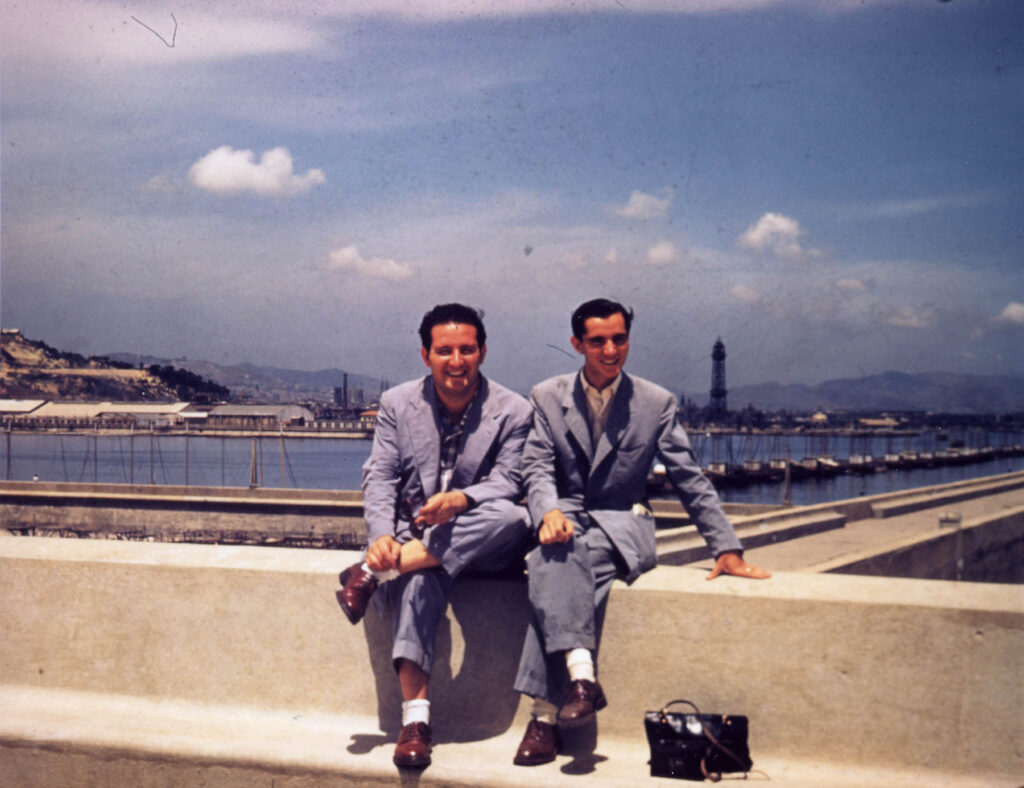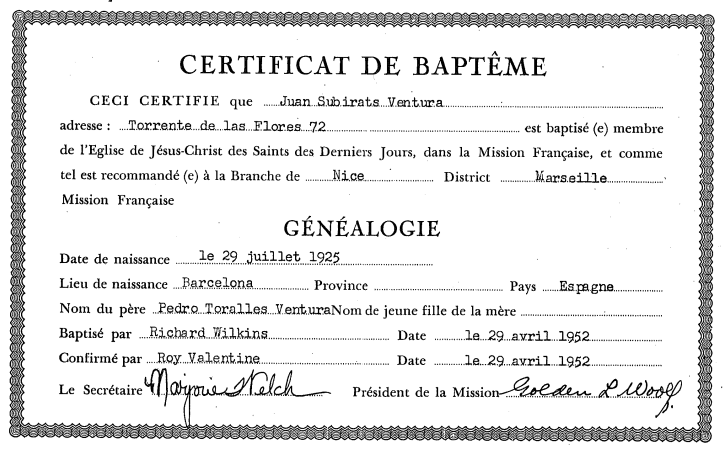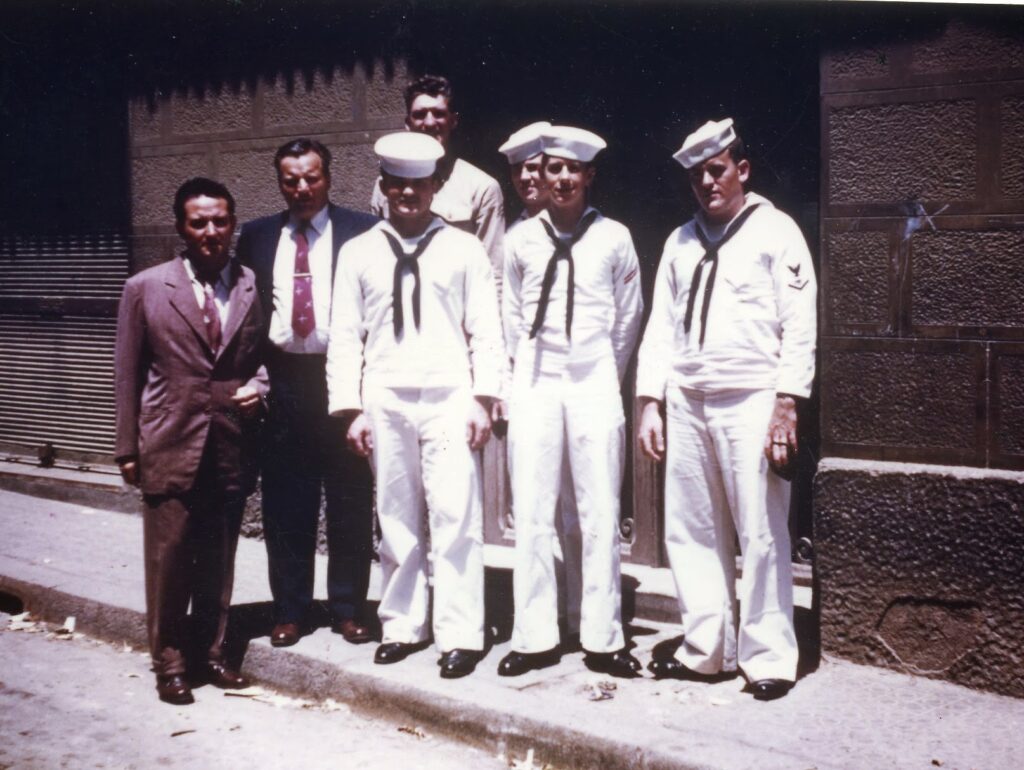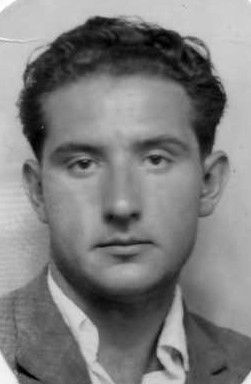General Conference, where members of The Church of Jesus Christ of Latter-day Saints gather around the world to hear messages from the prophet, apostles, and other church leaders, was held the first weekend in April. At the end of the conference, President Russell M. Nelson announced the locations of 17 new temples to be built around the world. Barcelona, Spain was on the list! To say our family is excited about this news is an understatement.
Meet my paternal grandfather, Juan Ventura, and his brother, Jordi. They are the first converts to The Church of Jesus Christ of Latter-day Saints from Barcelona. I wanted to share portions of Juan’s autobiography with you today that tells about his conversion and the religious persecution he suffered. It’s an amazing story!

My grandmother, Betty, also plays a part and their love story will be shared another day.
“In 1948, my brother, Jordi, and a group of our friends began studying different Protestant religions. They would visit the churches in Barcelona and ask the ministers about their doctrines. Jordi was 16. He spoke to one minister who had lived in Geneva, and when he told him what they were doing, the minister suggested they check the Mormon Church because it had some very interesting teachings. When Jordi asked him why he was not a Mormon, the man said, “Because they don’t pay their ministers.” Jordi got the address of Church headquarters from the American Consulate and wrote a letter inquiring about their doctrine. He addressed it simply: President, Mormon Church, Salt Lake City, Utah.
[Betty’s insert: At this time I was working in the Translation department in Salt Lake as Brother [Eduardo] Balderas’s secretary. Jordi’s letter was forwarded to him for translation. His letter caused quite a stir in the First Presidency’s Office, and Eduardo was instructed to do his best to maintain correspondence with this contact in Spain and it could prove to be very important. Eduardo sent him several missionary tracts and other materials about the Church. Jordi, in turn, asked if other members of the Church could also write to strengthen ties with his group. I remember writing one letter to the Ventura family]
“In the minutes of the October General Conference of 1949, Elder Antoine R. Ivins of the First Quorum of Seventy made the remark that “a young man from Barcelona, Spain, had recently written: “I have come to realize that baptism in the Church of God is essential. I believe that Catholic baptism is invalid, and that Protestant baptism is even worse.” [General Conference Report pg135: https://scriptures.byu.edu/#:t1ad:p519]
[Betty continues: At that time my sister Norma was serving in the French Mission, and our father suggested that I meet Norma in Paris at the close of her mission and tour Europe with her . . . . My dad offered to pay for my trip, and I remember him adding, “And you could visit the family in Barcelona that you talk about so much.”So that became our plan. In June of 1950 I started off on my European journey, traveling by Greyhound Bus to New York, then boarding the Queen Elizabeth, and meeting Norma in Paris. After three weeks of touring through Holland, Austria, Switzerland, Italy, etc. we crossed into Spain and were met by a very young Jordi Ventura at the train station. By then he was almost 18 but appeared much younger. We spent four days in the Ventura home, met the family, and were taken on tours of Barcelona by different family members – Jordi, Juan, Joaquina’s husband, Luis Moreno. After we returned to Salt Lake, Juan and I began writing to each other, just friendly letters, and this correspondence continued for about three years.]
[Juan continues] “Later on in the year 1950, Jordi and our brother-in-law Luis Moreno traveled up to Nice and were baptized by missionaries in the French Mission on September 28, 1950. I was unable to get a visa at that time. In 1952, I was able to secure a visa and traveled up to Nice. I was baptized April 29, 1952 by Elder Richard Wilkins of the French Mission and confirmed by Elder Roy Valentine. It was very chilly there on the beach. My baptism was performed in the Mediterranean Sea and I was confirmed immediately after, while sitting on a rock and still in my wet clothes. My remembrance of my baptism was mostly of how cold I was sitting there on that rock.

“Jordi (who had traveled to France with me) and I stayed on in Cannes for about six months, and attended the branch there. I worked at different jobs, one of them in a cemetery digging graves. Sailors from the U.S. Sixth Fleet were stationed in the Mediterranean area and they also attended the branch. They told me that American bases would soon be opened in Spain, and they had hopes of visiting Barcelona. I invited them to visit us in our home after we returned home.
“I later returned to Spain. Jordi remained in France and later on was given a scholarship to the BYU and came to Salt Lake City. As it was during the summer and the university hadn’t opened yet, he stayed at Betty’s home in Salt Lake and did some translation work for the Translation Department.
“In Barcelona we had several visits from ex-French missionaries and then some of the American sailors from the Sixth Fleet came to see me.

“In July of 1953 a larger group of sailors, forty of them all in white uniform, came to our apartment. They held a meeting with us; we sang hymns and partook of the sacrament. They did not realize that under Franco’s regime this was putting me in danger. It was against the law for a group of more than five persons to meet together without official permission, unless they were all members of the same family. Two days later two policemen came to our apartment asking for me. I was working in a town called Vilanova i la Geltru making an electrical installation. On the way home I decided to phone my mother. This was unusual for me to do. When I asked her how everything was, she said, “We have some ‘gindas’ here.” (A “ginda” is a cherry, and as the police wore red jackets, it was a code word in the family for a policeman, so I had a slight warning of what awaited me.) When I reached home, the policemen questioned me and then took me to the police station on Via Layetana where I was “booked” and put in a cell. My mother, who had accompanied me, returned in the evening with some shaving articles. She was told by the officer in charge that there was no one by the name of Juan Ventura there. Then something interesting occurred. My mother heard a tune being whistled – It was the first line of “Come, Come Ye Saints.” This is what family members whistled when entering the front door of the apartment building where we lived. It was a signal for someone inside the apartment, one flight up, to open the door. When my mother heard this whistling, she said, “Oh yes, he’s here. He’s right over there” – pointing to where the sound came from. When a policeman went inside to find me, I was asleep!
“During the four days I was imprisoned, I was questioned various times. The first time, I was made to lean up against a wall with my full weight resting on my thumbs. While in this position, they hit me on the back with a rubber hose, asking over and over, “Are you a member of the Mormon Church?” The second time I was put in a cold shower fully clothed, until I shook with cold, then was taken back to my cell with my clothes left to dry on me. This made me feel the cold even more. The next time I was stretched out on a table, my shoes and socks were taken off, and I was hit on the bottom of my feet with a rubber hose which broke the tendons inside without leaving a mark. This left me so that I could barely walk. I felt the effects of these beatings for years after. Between beatings I lay unconscious in my cell most of the time. On the fourth day, a friend of mine, a friend from my school days who was a policeman, saw me and asked, “Ventura, what are you doing here?”. He was a policeman by profession and had nothing to do with politics. I gave him a confused answer and he could see the condition I was in. He went to the prison officials and told them that he knew me and that I was not involved in politics. (Somehow they took it that my affiliation with the Mormon Church had political significance.) But my friend vouched for my character.

“So within hours, I was released and allowed to leave. I was so confused that I went out on the street and began walking towards the sea instead of towards my home. I reached the port and was wandering around when a taxi driver who knew me, saw me and took me home.
“The police had taken all my papers – my identification card or carnet, which allowed me to work, and my passport which would allow me to travel. I couldn’t work to support myself and my mother, and I couldn’t leave Spain. I was out of jail but I certainly was not free. My condition was still desperate. A friend helped me out at this time. He ran a store selling electrical components, and agreed to buy small rectifiers that I could mount at home. That would be our income.
“Although all mail was still censured, through family code words, my family was able to write to Jordi about my arrest. Jordi was living at Betty’s parents home in Salt Lake, waiting to enter BYU in the fall. They told him my condition. He immediately relayed news to Betty, and you can read in her story her reaction and the course she decided to take. She and her friend, Norma Schofield, would come to Barcelona in February of the following year, 1954.”
—————————————————————————
There is much more to the story, but for today, that is all I will share. I am so grateful for the heritage of faith and faithfulness my ancestors have passed on to me.
Read part two of Juan and Betty’s Story here.
What a story! Both of my grandfathers joined the church in “the old country”, one in Norway, the other in Scotland. But neither suffered the persecution that yours did. All the same, I’m so grateful they answered the gospel call.
Wow! That’s a story to be treasured and shared!